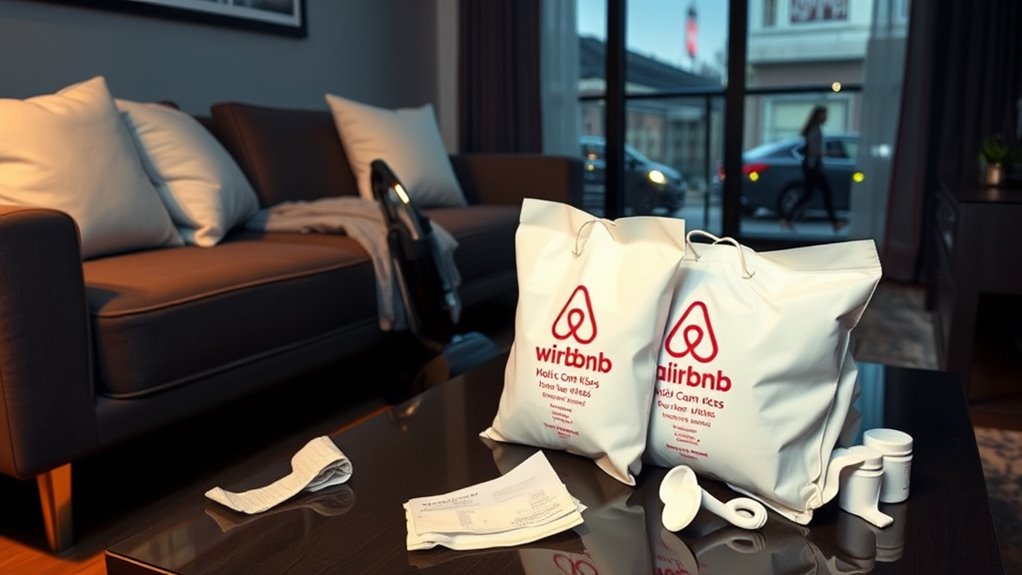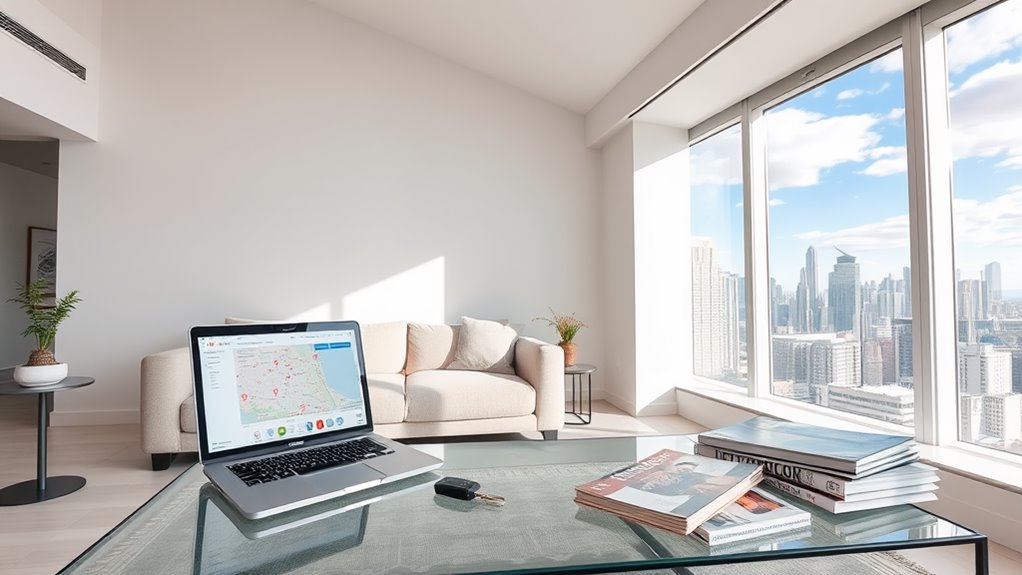Airbnb arbitrage allows you to lease a property long-term and rent it short-term on Airbnb for a profit. You capitalize on the gap between monthly lease costs and higher nightly rates, especially in high-demand areas. It’s a low-capital strategy that scales well but requires market research, landlord approval, and compliance with local regulations. Tools like AirDNA and dynamic pricing software can optimize your earnings. Explore further to uncover the full potential of this investment model.
Key Takeaways
- Airbnb arbitrage leases properties long-term to rent short-term on Airbnb for profit.
- It exploits price gaps between long-term lease costs and short-term rental income.
- Success depends on high-demand areas with significant nightly rate premiums.
- Startup costs range $7,000-$11,000 for furnishing a one-bedroom unit.
- Compliance with local laws and landlord permission is essential for legality.
Understanding Airbnb Arbitrage
Airbnb arbitrage leverages the gap between long-term lease costs and short-term rental income to generate profits. You’ll secure a property through a long-term lease, then list it on Airbnb as a short-term rental. This business model thrives in high-demand areas where nightly rates substantially exceed your monthly lease payments. Your potential income depends on factors like occupancy rates, nightly pricing, and operational expenses such as cleaning and maintenance. To start, you’ll need a budget for furnishings, typically ranging from $7,000 to $11,000 for a one-bedroom apartment. Success in this rental arbitrage business hinges on strategic property selection and efficient management. However, you must navigate local laws and landlord agreements, as many cities impose rental caps or require permits for short-term rentals. By aligning your strategy with regulatory and market conditions, Airbnb arbitrage can become a lucrative venture in the short-term rental business.
How Airbnb Arbitrage Works

While leveraging the difference between long-term lease costs and short-term rental income may seem straightforward, Airbnb arbitrage requires a nuanced approach to maximize profitability. Rental arbitrage refers to leasing a property long-term and then listing it on booking platforms like Airbnb to generate higher short-term rental income. Your Airbnb rental arbitrage business requires thorough market research to identify areas with high demand and favorable regulations. You’ll also need to cover startup costs, such as furnishing the property and equipping it with essentials. Managing multiple listings can diversify your income and reduce risks associated with seasonal fluctuations in the short-term rental market. Tools like PriceLabs help optimize pricing to align with demand, ensuring you consistently rent out your property at competitive rates. Careful planning and strategic execution are essential to building a sustainable Airbnb rental arbitrage income stream.
Legal Considerations for Airbnb Arbitrage

Before starting Airbnb arbitrage, you’ll need explicit landlord permission to avoid lease violations and potential eviction. You must also research and comply with local short-term rental laws, including permits, taxes, and zoning restrictions. Additionally, securing proper insurance coverage protects you from liability risks associated with hosting. Understanding local regulations can significantly impact occupancy rates and operational costs, ensuring long-term profitability.
Landlord Permission Essentials
Since Airbnb arbitrage hinges on subletting, securing explicit landlord permission is a critical first step to verify your operations remain legally compliant. Before approaching your landlord, confirm that short-term rental arbitrage is permitted under local laws and regulations. You’ll need written consent to modify your lease agreement, as unauthorized subletting can result in eviction or legal penalties. Review Airbnb’s terms, which mandate compliance with local short-term rental laws and obtaining necessary permits. Cities like New York and San Francisco have stringent short-term rental regulations, so research specific restrictions. Gaining landlord approval is non-negotiable: it safeguards your Airbnb arbitrage business, confirms adherence to your rent agreement, and mitigates risks. Without it, you risk violating local regulations and jeopardizing your investment. Always prioritize transparency and legality.
Local Law Compliance Tips
To guarantee your Airbnb arbitrage strategy stays legally sound, you must thoroughly research and adhere to local laws governing short-term rentals. Start by checking your local laws to confirm if rental arbitrage is legal and whether short-term rentals are allowed in your area. Secure short-term rental permits if required, as failing to comply can lead to penalties. Review zoning laws and municipal codes to verify your property meets all rules and regulations. Don’t overlook HOA rules or lease agreements, as they may restrict subletting. Stay updated on evolving regulations to maintain your operations remain compliant. Ignoring these steps can jeopardize your business, so prioritize understanding and adhering to local laws to safeguard your Airbnb arbitrage success. Adhering to local laws ensures legal compliance and protects your investments from potential disputes.
Insurance And Liability Coverage
While Airbnb’s Host Protection Insurance offers up to $1 million in liability coverage, it’s critical to assess whether it’s sufficient for your arbitrage operations. Short-term rental insurance tailored to Airbnb arbitrage often provides broader protections, including property damage and loss of income protection, which aren’t fully covered under Airbnb’s policy. Additionally, landlords may require you to add them as an additional insured on a commercial liability policy to mitigate their risks. In some cities, short-term rental operators must carry specific insurance, such as $1 million in liability coverage, to comply with local regulations. Evaluate specialized options like Proper Insurance to guarantee extensive liability coverage and safeguard against potential financial losses. By securing robust insurance, you protect both your assets and your business model in the competitive landscape of short-term rentals.
Steps to Start Airbnb Arbitrage

Start by conducting detailed market research to pinpoint high-demand locations and assess competitor strategies for effective property selection. Verify your lease explicitly allows subletting and secure landlord approval to mitigate legal risks. Finally, obtain necessary licenses and comply with local regulations to establish a fully compliant Airbnb operation. Consider targeting mid-term rentals if your location aligns with the needs of travel nurses or remote workers.
Market Research
Before diving into Airbnb arbitrage, you’ll need to conduct thorough market research to verify your venture is viable and profitable. Start by analyzing average daily rates and occupancy in your target area using tools like AirDNA’s MarketMinder. This helps you understand demand, competition, and pricing trends. Review local short-term rental regulations to confirm compliance and avoid legal issues. Compare your potential rental income on Airbnb to long-term lease costs to assess profitability. Identify high-demand neighborhoods by evaluating key metrics like occupancy rates, average daily rates, and booking trends. Use data-driven tools such as Awning’s Airbnb Estimator to forecast revenue and occupancy accurately. By focusing on these factors, you’ll gain strategic insights to make informed decisions and maximize your returns. Understanding rental market analysis is essential for setting optimal pricing and ensuring long-term financial success.
Property Selection
Once you’ve identified a profitable market, focus on selecting the right property to maximize your Airbnb arbitrage success. Start by estimating the average monthly rental rates in your target location using tools like Zillow. Analyze local Airbnb listings to gauge demand, occupancy rates, and average nightly rates, guaranteeing your property can compete effectively. Prioritize locations near attractions, transportation hubs, or business centers, as these areas typically attract higher numbers of guests. Make certain the property’s size and layout align with short-term rental appeal, offering comfort and functionality. Finally, confirm the landlord permits subleasing and review the lease terms to avoid legal conflicts. A strategic property selection sets the foundation for consistent bookings and long-term profitability in your Airbnb arbitrage venture.
Legal Compliance
Though Airbnb arbitrage offers significant earning potential, ensuring legal compliance is critical to avoid costly penalties or disputes. Start by researching local laws to confirm short-term rental property management is permitted in your area, as regulations vary widely. Obtain the owner’s permission in writing to sublet the property, and review your lease for clauses restricting short-term rentals. Many cities require a permit or license to operate legally, so secure these early to avoid interruptions. Compliance with Airbnb’s terms is equally essential, including adherence to local short-term rental regulations and maintaining proper insurance coverage. By addressing these legal considerations upfront, you’ll reduce risks, protect your investment, and establish a solid foundation for managing rental costs and maximizing your success as an Airbnb host.
Key Tools for Airbnb Arbitrage Success

To maximize success in Airbnb arbitrage, you’ll need to leverage specialized tools that streamline operations and optimize revenue. Vacation rental software like Guesty can centralize booking, guest communication, and cleaning schedules, saving time and reducing errors. Automation tools such as Beyond Pricing adjust nightly rates dynamically based on market demand, seasonality, and local events, ensuring you maximize Airbnb income. Platforms like AirDNA’s Rentalizer provide critical data on revenue forecasts and occupancy rates, helping you identify the best listings to add to your rentals. NoiseAware monitors noise levels to enhance the guest experience and avoid complaints, while KeyData Dashboard offers insights into competitor pricing and market trends, enabling you to build a business that stays ahead. Social media integration tools can also amplify your reach, ensuring your listings attract the right audience. These tools collectively empower you to operate efficiently, scale strategically, and thrive in a competitive vacation rental market.
Profit Potential of Airbnb Arbitrage

The profit potential of Airbnb arbitrage hinges on strategic property selection, efficient management, and dynamic pricing optimization. You can achieve cash flow two to three times your monthly rent by leveraging high-demand locations and maximizing nightly rates. For example, a property costing $1,500 monthly might generate $250 per night on weekends, creating substantial income after expenses. Scaling your portfolio to multiple short-term rental units amplifies earnings—some arbitrageurs manage 10+ properties for higher revenue streams. Automation tools streamline guest communication, maintenance, and booking processes, allowing you to focus on optimization. By diversifying across platforms like Vrbo and Booking.com, you reduce dependency on Airbnb and enhance occupancy rates. Optimizing pricing strategies secures you capitalize on peak seasons while maintaining steady bookings during off-peak periods. Balancing these factors—pricing, scaling, and automation—positions you to access the full profit potential of Airbnb arbitrage.
Challenges in Airbnb Arbitrage

While Airbnb arbitrage offers significant profit potential, it’s not without its hurdles. Local regulations and zoning laws often restrict or ban short-term rentals, forcing you to navigate complex legal issues or face fines. Lease agreements may explicitly prohibit subletting, requiring clear communication with landlords to avoid eviction. High upfront costs for furnishing, deposits, and marketing can strain your initial profitability, especially in competitive markets. Seasonal fluctuations also pose a risk, as inconsistent booking rates during off-peak periods can destabilize your income. Additionally, competition from other Airbnb hosts and hotels in popular areas can drive down nightly rates, squeezing your margins. Balancing these challenges demands meticulous planning and adaptability to guarantee your arbitrage venture remains viable despite the obstacles.
Best Markets for Airbnb Arbitrage

When identifying the best markets for Airbnb arbitrage, targeting locations with high demand, solid occupancy rates, and strong average daily rates (ADR) is essential for maximizing profitability. Gatlinburg, TN, stands out as a highly profitable market with a $227 ADR, 73% occupancy, and $42,000 annual revenue potential, making it ideal for short-term rentals. Sedona, AZ, offers an impressive $228 ADR and 78% occupancy, yielding up to $44,000 in annual revenue, ensuring a high ROI. Kissimmee, FL, a popular tourist destination, boasts a $170 ADR and 77% occupancy, generating $32,000 annually—perfect for an arbitrage property. Blue Ridge, GA, mirrors these figures with a $170 ADR and 77% occupancy. Chattanooga, TN, while slightly lower, still delivers a strong ROI with a $122 ADR and 68% occupancy. Focus on these markets to optimize your real estate strategy and achieve consistent profitability in Airbnb arbitrage.
Conclusion
Imagine opening doors to financial freedom by transforming rentals into profitable Airbnb stays. Airbnb arbitrage is your bridge to this opportunity, blending strategic planning with market analysis. By leveraging tools and maneuvering legalities, you’ll carve a path to passive income. Yet, tread carefully—market saturation and operational challenges loom like storm clouds. Choose your market wisely, and with diligence, you’ll see profits bloom like a well-tended garden in the right season.




